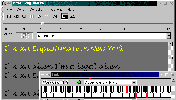KMid's homepage
What is KMid ?
KMid is a X11 / KDE based midi player for Linux and FreeBSD.
KMid displays the text of karaoke files and change its colour as it is
being played so that the tune can be easily followed !
It uses /dev/sequencer as output device supporting external synths, AWE , GUS and now also FM cards (such as sb16 or sbpro).
Tell me more about KMid
KMid current version has support for midi mappers, karaoke,
playlists, and much more.
As of version 0.2, it supports Drag&Drop, customizable fonts, possibility
of playing some broken midi files, etc.
Version 0.3 includes an option to automatically select the type of lyrics that a song includes, better support for corrupted files, real session management (the application is not only restarted, but restored), etc.
Version 0.4 provides support for AWE and GUS cards, as well as a dialog to select the output device and midi map to use. Also supports playing gzipped files and has some bug fixes (as well as new bugs ;-) ).
Version 0.4.1 only fixes some problems with GUS (now it works !), and other small things.
Version 0.5 main news are support for FM devices and collections (also called playlists)
Version 0.5.1 has been released the same day than 0.5 just to fix a very
small bug and improve (greatly) the FM support
Version 0.6 includes some bug fixes and improved synchronization between
music and lyrics. KMid 0.6 now works in English and Spanish (other languages
coming soon), with full translations of help.
Version 1.0 has some bugfixes (just changed the number to celebrate the KDE 1.0 announcement)
Version 1.2 added the channel view (see features, or better, screenshots :-)), volume bar
and various bug fixes.
Version 1.7 fixed many things, mainly a problem that made KMid play midi files with a random tempo on some systems. It also contains a fix to work with 2.2.x kernels, a fix for AWE devices that were playing with a too high pitch, compiler bugs workarounds,
etc.
Please note that KMid is being developed inside the CVS tree of KDE in the kdemultimedia module.
I won't provide binary packages here any longer as it takes a lot of time preparing them and
I lack free time (in any of its forms) to do everything I'd like to do. Sorry for the inconvenience.
Btw, as a curious note, I started KMid's development on the 11th of September of 1997.
I'd like to see KMid's features
- KMid has a nice interface to display karaoke lyrics.
- A channel view to see what notes is each instrument playing.
- Supports external midi synths, AWE cards, FM output, and GUS (for the later, needs the Linux Ultrasound Project driver and gusd installed).
- Powerful Midi Mapper that will make people with no general midi synths happier than ever :-).
- Collections with unlimited number of songs !
- Drag & drop so you can drop in KMid any midi file from a kfm window.
- Customizable fonts for karaoke text to be displayed.
- Supports the two standards to introduce lyrics in midi files, that is, lyrics or text events (and guess which one a song uses automatically)
- Session Management. If a song is playing while you logout from KDE, the next time you login, the same song will start playing !
- Can play some broken midi files which make other players core dump !
- Can open gzipped files just as any other midi file.
- A Volume bar to change the volume of the song.
- Consumes approximately 0.1% of my CPU (depends on the complexity of the song)
- Runs on Linux and FreeBSD (perhaps also other unices ...)
I want to see a screenshot !

If you prefer to see a bigger, better quality screenshot, just click here.
Where can I download KMid current version from ?
You can download KMid from any of the KDE mirrors, as it's included inside the kdemultimedia package, just search on ftp.kde.org mirrors.
You probably have it already installed, as KMid is included in all of the major Linux distributions by installing the kdemultimedia package.
If you want to check the latest unstable release, you can just download a kdemultimedia snapshot from KDE's cvs.
What are KMid terms of use ?
KMid is distributed under the GNU General Public License Version 2.
